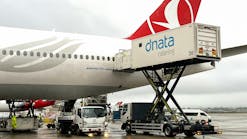In April of 2019, the International Air Transport Association (IATA) launched their Training Validation Program (TVP), a certification program which recognizes excellence in workplace learning practices and compliance with international and industry training standards.
“It enables organizations across the aviation industry to assess and improve workplace learning capacity, develop learning facilitators and specialists, improve workforce performance and competencies. It also provides employees with high-quality and effective training that meets industry standards,” explains Yaniv Sorany, IATA senior manager, cargo training and validation programs.
Sorany adds that the main objectives of the TVP are to:
- Address industry concern and requirements to ensure sustainable growth
- Establish a globally consistent, recognized and standardized certification program
- Raise the bar in the industry and give visibility to certified organizations
- Develop standards of operation for management of training, instructional design and development, facilitation, evaluation and performance measurements
- Advance the adoption of competency–based training and assessment
- Elevate workforce competency and improve performance of air transport
- Promote cooperation and mutual recognition among stakeholders
Çelebi Aviation, and its training division Çelebi Aviation Academy, became the first IATA recognized ground handling company to successfully achieve Center of Excellence recognition for the training organization. In addition, Çelebi was recognized with a Certificate of Validation for Passenger Handling training – attesting that both the content and the process for employee training meets the standards set by the IATA Airport Handling Manual (AHM).
Each certification involves a comprehensive assessment of the organization’s training system, standards of operations and management.
Derya Tekin Yusuf, board member, training and development for Çelebi, says the company has a priority to improve standards and ensure high-quality training. The company’s pursuit of greater training programs overlapped well with the objectives of IATA’s TVP, leading to Çelebi’s enrollment in the program.
“Çelebi aims to establish high standards for management of training and development, elevate staff competency through efficient and robust training programs, advance the adoption of competency-based training and assessment approach, improve safety, efficiency and sustainability in ground handling and cargo operations, enforce compliance with the industry training standards and requirements and raise the level of professionalism and service quality in the industry,” Yusuf says.
The Path to Certification
Candidates for TVP certification include, but are not limited to, airlines, airports, cargo terminal operators, civil aviation authorities, freight forwarders, ground handling companies and other operators across the entire supply chain, dedicated to air transportation. The TVP process covers three distinct phases: assessment, validation and certification.
“The TVP strives to achieve standardization and uniformity in the scope, depth and quality of the assessments conducted,” says Sorany. “To ensure all organizations are assessed in a consistent and objective manner, standardized assessment checklists and criteria have been developed to guide the assessor and the organization through the assessment process.”
Assessment of a training organization covers the following key areas of the participating operation: organization and management; training design; training development; assessment, or testing, and evaluation; training effectiveness; qualification of instructors and evaluators; training documentation and records; and facility and infrastructure.
The assessment of a training course then covers: initial and continuing qualification; instructional personnel; training documentation and records; and training modules and content.
The TVP then consists of certification at two levels: recognition of a training organization (TVP-Organization) and validation of a training course (TVP-Course).
“The recognition of an organization allows companies to assess and improve training standards and quality management in the critical areas of operations in the organization.
“It provides an organization with the opportunity to acquire Center of Excellence – Training Organization recognition from IATA, attesting that the workplace’s learning program is benchmarked against and meets IATA's training standards, after the organization’s learning systems have been assessed by IATA,” says Sorany.
A training course validation allows an organization to assess and improve the initial and continuous qualification program, instructional materials and content in aviation operational-related training courses in the area of security, safety, cargo, ground operations, facilitation, environment, economic, etc.
Çelebi’s certification path began by meeting with IATA TVP experts to discuss the requirements of the program.
“We consider IATA TVP as a learning journey; hence one should make a plan about the journey. With this mindset, we started making a plan by understanding where we stand in terms of our strengths and weaknesses, where might we have challenges and how we can overcome these,” says Yusuf.
Yusuf says the conversations with IATA were both surprising and exciting, and described the entire experience as a great opportunity to gather feedback from the industry experts. To their surprise, officials at Çelebi found themselves already nearly in line with the standards laid out by the TVP.
“We were amazed to hear from the IATA team that our training materials and procedures were almost aligned with criteria. We were very pleased to see that Çelebi is a truly living school in the aviation industry. There were minor changes to be made in documents in order to adapt to the checklists,” says Yusuf.
The biggest challenge for Çelebi was the localization process as the company operates on two continents, in four countries and with more than 40 stations.
“As we must be in compliance with local authorities, we encountered differences at some points related to criteria such as experience level of trainers,” Yusuf says. “In order to overcome these kinds of issues, we work closely with our Academy team members in the countries, as well as IATA experts, in order to reach a common point and make adjustments locally.”
Çelebi completed both of its certifications within three months, which is generally the average time a TVP certification takes, notes Sorany.
“As Academy Team, we made huge efforts to complete this process very quickly and efficiently by regularly conducting follow-up meetings within in the team as well as with IATA. However, this duration may change for each respective company, according to their readiness,” says Yusuf.
Post Certification
Since becoming TVP certified, Yusuf says that benefits have been vast for both Çelebi’s employees and the Aviation Academy.
“It ensures that our training and professional development activities are cost-effective, goal-oriented and productive; standardizes performance across the subsidiaries; improves quality of products and services and sets clear expectations for employees, enabling them to make better decisions and work more effectively,” Yusuf says.
Specific benefits that Çelebi has seen are a boost to employee performance; reduced costs for management and improved managerial functions for its Academy; increased company-wide productivity; greater avoidance of workplace accidents; better customer service; and employees are keeping up-to-date with the latest knowledge.
“We continue to advance the adoption of competency–based training and assessment, elevate workforce competency and improve performance of air transport and promote cooperation and mutual recognition among stakeholders as well as addressing industry concerns and requirements to ensure sustainable growth,” Yusuf adds.
Çelebi Aviation Academy is now working towards certifications for other ground operations, such as ramp handling, load control and cargo, among others.
“After establishing a globally consistent, recognized and standardized certification program, we do believe, we raise the bar in the industry and give visibility to certified organizations while developing standards of operation for management of training, instructional design and development, facilitation, evaluation and performance measurements,” says Yusuf.
TVP certifications last for two years, with IATA conducting spot checks during the validity of the certification.
“Re-assessment takes place after 24 months to ensure compliance with the latest standards and the program requirements,” says Sorany.
Currently, there are more than five companies undergoing TVP certification, with several others reviewing the requirements and next steps to benefit from certification.
Sorany adds that the IATA is continually revamping, updating and revising their materials and tools so that they maintain its relevance for all stakeholders. Most recently, IATA updated its materials to reflect the changes due to COVID-19 and to address the training requirements for virtual learning during the lock-down.
“The aviation industry has been growing year-on-year and despite the grounding of flights for several months during the height of the COVID-19 pandemic, the industry is expected to pick up and increase significantly in the coming decades. Pre-COVID-19 forecasts estimated that in the next 20 years the industry will support 97.8 million jobs and though it may take longer to reach these numbers, we still expect significant growth,” says Sorany. “This growth will bring many challenges that will need to be overcome to ensure that aviation is prepared to meet future demands. Key among these challenges will be attracting, developing and retaining appropriately skilled staff in the air transport and logistics industries.”
IATA officials are also looking ahead to ways in which they can enhance the program through more partnerships, cooperation and mutual recognition from international and national authorities to enable the expansion of the TVP program to optimally support the industry in training its growing workforce.





